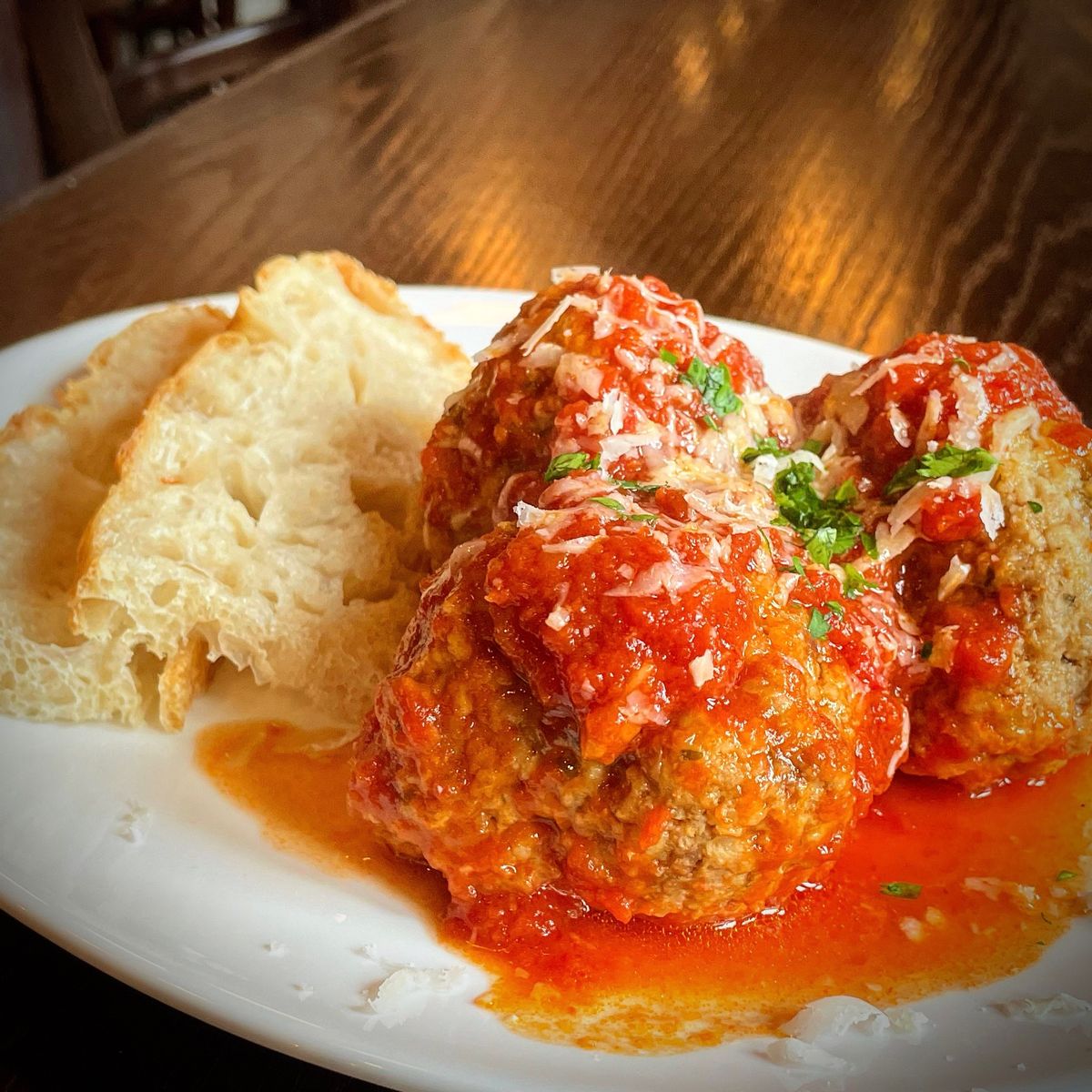Anytime you walk into Peanut Park Trattoria, the year-old Italian restaurant in the heart of Chicago's Little Italy, you'll most likely see an order of meatballs on almost every table. Indeed, the restaurant churns out upwards of 200 orders each week.
This could be easily explained by the indisputable, comforting appeal of meatballs. But these baseball-sized creations are especially good — tender yet substantial, juicy and savory, richly seared then submerged in sweet, rich tomato sauce. What you might not know is you're actually eating a "compromise meatball" between co-owner Dave Bonomi and co-owner/executive chef Tony Fiasche.
Meatball construction is a nostalgic, deeply personal business. The pressure no doubt ratchets up when you're a restaurant owner charged with feeding the finicky, nostalgic masses. Bonomi and Fiasche were both already restaurant owners when they opened Peanut Park together in December 2021.
Meatball construction is a nostalgic, deeply personal business.
Bonomi owns iconic, coal-forged pizza minichain Coalfire. There, the meatballs topping the Vodka Meatball pizza are unabashedly chock full of beef, butter and cream-soaked croutons, and perfumed with Bonomi's most beloved herb basil. Bonomi formed his first (professional) beef-and-veal meatball at age 12, while working at Rocco's Pizzeria in Naperville, Ill.
And every Sunday of his adulthood when he's not at work (few and far between these days) commences with Sunday sauce, into which he plunks fat beef meatballs after searing them in a cast-iron skillet.
Fiasche, however, is best known for pork — specifically, 'nduja. He and his father and business partner Agostino Fiasche put the spreadable spicy pork sausage on the map in Chicagoland with their salumeria 'Nduja Artisans, which they followed up with deli/grocer Tempesta Market. Fiasche Sr., the namesake and chef of 37-year-old Ristorante Agostino, brought his family salumi tradition as an immigrant from Calabria in southern Italy. Tony Fiasche's preferred home-cooked meatball is a Neapolitan — dotted with plumped raisins and buttery pine nuts. But whatever kind he's forming, the foundation is always the same.
Want more great food writing and recipes? Subscribe to Salon Food's newsletter, The Bite.
"There's nothing like a heritage pork meatball," Fiasche says. "But I might be biased; it's kinda my livelihood."
So, naturally, the compromise meatball would be as simple as creating a 50:50 split of beef and pork, right? Not quite.
The Peanut Park meatball indeed comprises humanely raised, half-beef and half-pork. And despite their fondness for ribbing one another over every minute detail of meatball construction, Fiasche and Bonomi overlap in a few other tenets. Both like flavoring meatballs simply, with a single herb like parsley or basil (parsley at Peanut Park) and sautéed onions and garlic.
"There's nothing like a heritage pork meatball. But I might be biased; it's kinda my livelihood"
"The sautéeing step step brings such a deep, roasted sweet flavor that you can't get from raw aromatics or onion or garlic powder," Fiasche says, adding: "Don't sauté them in too much oil, or it'll mess with the bind and structure of the meatball, making it brittle."
A generous pinch of red pepper flakes in Peanut Park's meatballs nod to Fiasche's family's roots in Calabria — where the heat of the region's namesake Calabrian chiles infuses almost everything.
Bonomi and Fiasche likewise agree on the importance of meatball hydration, though they diverge on how to best go about this. Bonomi goes all in on dairy, particularly at Coalfire, where he starts by making garlic-butter croutons, which he then blitzes into breadcrumbs.
"Then, I take those buttery breadcrumbs and soak them in heavy cream — not milk, not water, heavy cream," he says. "Take that, Tony. And those go into the meatball. A lot of times when you're rolling them, you can feel in your palm if they're going to be moist enough. If not, add more heavy cream."
Fiasche, a self-described student of his parents when it comes to cooking, prefers adding moisture to meatballs the way his mom does, via a few spoonfuls of tomato sauce, which he gently works into the meatball mixture.
"I would not be putting milk in there," he says with a laugh. "I just wanna make sure we're clear on that."
Bonomi won this battle at Peanut Park, where hunks of the restaurant's housemade rosemary focaccia are soaked in whole milk before joining the meatball's remaining components. Hopefully by now, though, you've lost count over who can claim more of Peanut Park's meatball. Like all great comfort food dishes, this one has taken on a life of its own — igniting a different, albeit connected, nostalgia with every bite. It doesn't have to taste exactly like the Neapolitan or veal meatball of Fiasche's and Bonomi's respective childhoods to evoke that warmth.
"This conversation has me reflecting on what the meatball means to me," Bonomi says. "One of the cool things — for sure to anybody who's Italian American — is when you talk about meatballs, it almost always brings up a family memory. I think about my mother, my grandmother, aunt, my dad. I think about my Great Aunt Annie from Italy who used to make them. It's so near and dear, the meatball, and so Chicago."



Shares